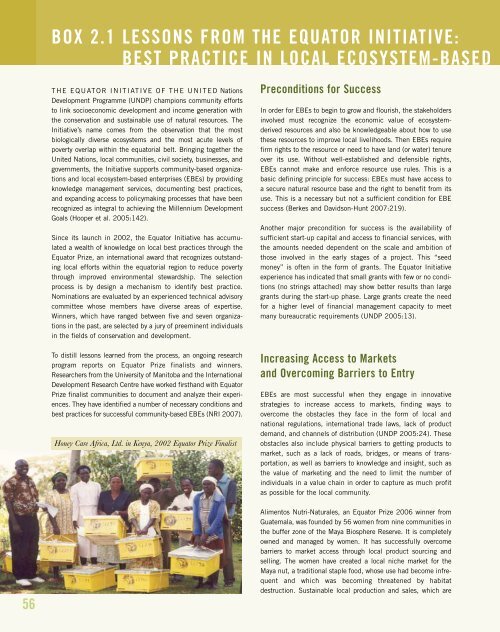Growing the Wealth of the Poor - World Resources Institute
Growing the Wealth of the Poor - World Resources Institute
Growing the Wealth of the Poor - World Resources Institute
You also want an ePaper? Increase the reach of your titles
YUMPU automatically turns print PDFs into web optimized ePapers that Google loves.
BOX 2.1 LESSONS FROM THE EQUATOR INITIATIVE:BEST PRACTICE IN LOCAL ECOSYSTEM-BASEDT H E E Q U AT O R I N I T I AT I V E O F T H E U N I T E D NationsDevelopment Programme (UNDP) champions community effortsto link socioeconomic development and income generation with<strong>the</strong> conservation and sustainable use <strong>of</strong> natural resources. TheInitiative’s name comes from <strong>the</strong> observation that <strong>the</strong> mostbiologically diverse ecosystems and <strong>the</strong> most acute levels <strong>of</strong>poverty overlap within <strong>the</strong> equatorial belt. Bringing toge<strong>the</strong>r <strong>the</strong>United Nations, local communities, civil society, businesses, andgovernments, <strong>the</strong> Initiative supports community-based organizationsand local ecosystem-based enterprises (EBEs) by providingknowledge management services, documenting best practices,and expanding access to policymaking processes that have beenrecognized as integral to achieving <strong>the</strong> Millennium DevelopmentGoals (Hooper et al. 2005:142).Since its launch in 2002, <strong>the</strong> Equator Initiative has accumulateda wealth <strong>of</strong> knowledge on local best practices through <strong>the</strong>Equator Prize, an international award that recognizes outstandinglocal efforts within <strong>the</strong> equatorial region to reduce povertythrough improved environmental stewardship. The selectionprocess is by design a mechanism to identify best practice.Nominations are evaluated by an experienced technical advisorycommittee whose members have diverse areas <strong>of</strong> expertise.Winners, which have ranged between five and seven organizationsin <strong>the</strong> past, are selected by a jury <strong>of</strong> preeminent individualsin <strong>the</strong> fields <strong>of</strong> conservation and development.To distill lessons learned from <strong>the</strong> process, an ongoing researchprogram reports on Equator Prize finalists and winners.Researchers from <strong>the</strong> University <strong>of</strong> Manitoba and <strong>the</strong> InternationalDevelopment Research Centre have worked firsthand with EquatorPrize finalist communities to document and analyze <strong>the</strong>ir experiences.They have identified a number <strong>of</strong> necessary conditions andbest practices for successful community-based EBEs (NRI 2007).Honey Care Africa, Ltd. in Kenya, 2002 Equator Prize FinalistPreconditions for SuccessIn order for EBEs to begin to grow and flourish, <strong>the</strong> stakeholdersinvolved must recognize <strong>the</strong> economic value <strong>of</strong> ecosystemderivedresources and also be knowledgeable about how to use<strong>the</strong>se resources to improve local livelihoods. Then EBEs requirefirm rights to <strong>the</strong> resource or need to have land (or water) tenureover its use. Without well-established and defensible rights,EBEs cannot make and enforce resource use rules. This is abasic defining principle for success: EBEs must have access toa secure natural resource base and <strong>the</strong> right to benefit from itsuse. This is a necessary but not a sufficient condition for EBEsuccess (Berkes and Davidson-Hunt 2007:219).Ano<strong>the</strong>r major precondition for success is <strong>the</strong> availability <strong>of</strong>sufficient start-up capital and access to financial services, with<strong>the</strong> amounts needed dependent on <strong>the</strong> scale and ambition <strong>of</strong>those involved in <strong>the</strong> early stages <strong>of</strong> a project. This “seedmoney” is <strong>of</strong>ten in <strong>the</strong> form <strong>of</strong> grants. The Equator Initiativeexperience has indicated that small grants with few or no conditions(no strings attached) may show better results than largegrants during <strong>the</strong> start-up phase. Large grants create <strong>the</strong> needfor a higher level <strong>of</strong> financial management capacity to meetmany bureaucratic requirements (UNDP 2005:13).Increasing Access to Marketsand Overcoming Barriers to EntryEBEs are most successful when <strong>the</strong>y engage in innovativestrategies to increase access to markets, finding ways toovercome <strong>the</strong> obstacles <strong>the</strong>y face in <strong>the</strong> form <strong>of</strong> local andnational regulations, international trade laws, lack <strong>of</strong> productdemand, and channels <strong>of</strong> distribution (UNDP 2005:24). Theseobstacles also include physical barriers to getting products tomarket, such as a lack <strong>of</strong> roads, bridges, or means <strong>of</strong> transportation,as well as barriers to knowledge and insight, such as<strong>the</strong> value <strong>of</strong> marketing and <strong>the</strong> need to limit <strong>the</strong> number <strong>of</strong>individuals in a value chain in order to capture as much pr<strong>of</strong>itas possible for <strong>the</strong> local community.56Alimentos Nutri-Naturales, an Equator Prize 2006 winner fromGuatemala, was founded by 56 women from nine communities in<strong>the</strong> buffer zone <strong>of</strong> <strong>the</strong> Maya Biosphere Reserve. It is completelyowned and managed by women. It has successfully overcomebarriers to market access through local product sourcing andselling. The women have created a local niche market for <strong>the</strong>Maya nut, a traditional staple food, whose use had become infrequentand which was becoming threatened by habitatdestruction. Sustainable local production and sales, which are
















